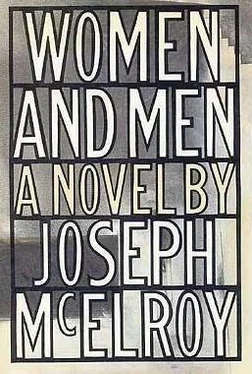But no, the father seemed like the friends to him because — wait — Jim slugged Sammy, they were fourteen, Sammy kicked him and ran, they all ran, they were running past the newspaper, the father was like the guys because, because, because he kept him from getting someplace he had to get to, that was how they were alike: it was dumb and a surprise arriving at that conclusion and maybe exhausting even while gulping a twisted toasty cruller at his grandmother’s, who wore her hair wound in a gray bun and had always told him stories you didn’t have to believe if you didn’t happen to but you still kind of did, and wanted more, and yet sometimes they had a funny brand of politeness between them, Jim and Margaret (he would jump up laughing even to himself in the middle of her story and run outside onto the kitchen porch and yank open the screen door and leap the seven steps(!) down onto the first flagstones of the backyard). Sometimes he thought he was supposed to be hearing things that he wasn’t, yet she left him alone, but not the way his mother had her way of being left alone. His grandmother smelled (more on one side than the other) of nutmeg he realized years later and soap the way his mother smelt of the same amber soap but pound cake and lemons for her tea. Slow the conclusion — like wading waist-high in Lake Rompanemus— because he didn’t quite know what it was, and exhausting (not his own word) because he knew he could follow it up, the conclusion, like the way he often thought about girls and what he liked and about New York (miles away across the Jersey flats with the Statue which was officially in Jersey very close facing away from them up the alley of the Narrows of New York Harbor) when they drove in once, he and his little brother Brad and two other kids with Mr. Bob Yard the electrician and his wife, who seemed to have a big running argument all the way so the boys stopped discussing how much money they had to spend for candy, the couple yelling at each other about his unpredictable driving and butting in when one or the other would speak to the kids who were not theirs, the couple making noise and all through this pretty much laughing, all the way to see Bing Crosby in a movie at Radio City Music Hall, New York hardly a fifty-mile drive, that seemed year by year more and more too close; but about his father being like his friends, well that conclusion wasn’t exactly exhausting either: it was like what you got left with when you arranged to already have other work (that you happened also to like) as an excuse when your father wanted you to work at (give him credit) a dime more an hour in the office of the paper running errands that involved taking down important reportable information, and doing "a bit of everything," with a chance to learn not only everything but how to engrave stationery—"where" what got substituted for, was whatever real reason stood behind the excuse of ("Sorry") already having more than enough odd jobs, a reason which was only half there, and this was like the conclusion about his friends and father which asked to be followed by a next thought but asked so that you half felt you’d made up its asking, and so this conclusion about his friends and his father keeping him from getting someplace he had to get to was more like letting go of a dream next morning that he half knew he could, if he tried to, follow up, since it had come only after he had woken up, not a sleeping dream which he didn’t ever have. And did follow up when he was staying up the street at his grandparents’, come to think of it, but this in turn wasn’t because his grandmother asked him for more of the dream once he got started; for she would have a story that was like his dream, he always accepted that; but with the conclusion about his friends and his father, he couldn’t follow it up, or not for a while; but then the next thought in the thought got together with the first one, he got to the next step by accident one day when he flashed anger like some ability withheld in his face at his grandmother for something she hadn’t meant to say but he throttled down seeing she was the one he loved, realizing it here fifty yards down the street from his own house but felt he hadn’t lost anything by blowing up, though it was wrong. And the step from that first thing about his father and his friends keeping him from where he had to get to was then that where he had to get to was this smart mother of his, but in her place was the future, and God that was where he had to get to. And the accident — accident? — that word his wife years later used when his own son, no paltry dribbler, unburdened himself in his pants at nursery school — was his grandmother saying, "Things haven’t been quite the same between your mom and dad since before Brad came along," but the next thing in Jim’s thinking was only months later and he’d been more openly opposing his father by announcing he was going to work for the summer on a friend’s family’s farm a few miles out of town where in the field where they would plant horse corn the furrows and red hunks of rock-like earth felt to the eye and the foot like a larger scale — planning to go to work there for the summer when his father wanted him in the office and made so much of this that Jim saw his father had gone a little crazy. Jim did not appeal to his mother. She was sick all that spring, that much he later and much later knew for sure: his father would tell her to see the doctor and she said he always said, See the doctor, or she said, Of course, of course; still, Jim found his way through the atmosphere in the house, he went to his mother. The house though he was older had gotten bigger. And the quiet after supper was a distance between his parents he would like to reckon by blame but he was stretched between where he’d been and where he had to get to and with no one to run him down more than his father who was somewhere downstairs or (who knew? by now) saying of Jim’s grades, "You have only yourself to blame," yet yes Jim went to his mother who was sitting on the edge of her bed watching him when he opened the door, one night after supper which she or Brad aged eleven had cooked, to tell her about the farm job that coming summer, and keeping in shape. She in her calm way smiled as if there were no trouble except maybe how to tell what was funny here, which you might get to in time but she hadn’t the energy for or maybe time. He didn’t mention his father, only the farm. She said she wished Jim’s little brother Brad would do something like that, that he would growl and sweat once in a while; and then she said, "You will go away where you belong."
This scared Jim because it came out like a command — but whose? and she was the one receding, or they both were and you couldn’t figure which of them more so.
And he anyway didn’t get around to telling her — because he didn’t have on hand the words to say — her drawn sick face kept from itself a health inside as sharp and dangerous as it was far.
"And live a more human life," his mother said, and did not reach out to touch him, though he saw it was late for her to tell him stories that she anyway had never been inclined to tell, for she played music instead, which his grandma did not, although his grandma told stories that at times came over as sort of true.
He remembered this thing about living a more human life, and a month later, between two victories that came exactly between 1940 and 1950 (one Victory-day to the East-called-West signed if not delivered, the other Victory-day to the West-called-East, to come in mid-summer), between these she was gone, gone into the elements except for yon granite memorial in the family plot that Jim and apparently his grandmother but he thought not his kid brother Brad liked to imagine preserved someone underneath. Their grandmother wrote an obituary, tore it up in small pieces, ordered a marker practically before Jim’s father got around to thinking about it — and had it placed; and, beside her in the cemetery one hot Sunday afternoon, Jim heard a throat cleared beside him, the beloved throat of his grandmother who had made him mad that day weeks before and got her as close to (in her words) "flummoxed" as she could be, for if what had made him, her grandson, mad was when she said, "Things haven’t been the same between your mom and dad since before Brad came along," still it was Jim himself who had started it when he said of his mother, "She’s always so glum, know what I mean? — I mean, excuse me for living. Why’s she have to be like that?" It wasn’t that she felt her mother Margaret had gotten too much mileage out of that trip in the 1890s, it wasn’t exactly that. It wasn’t that family stories made her impatient — though they did — but did she not have any? But Margaret replied, "She’s not always glum by any means." Which was very true. His mother’s drawn face was less sick-looking than (y’know) it kept from itself a health inside as sharp and dangerous as it was far.
Читать дальше












